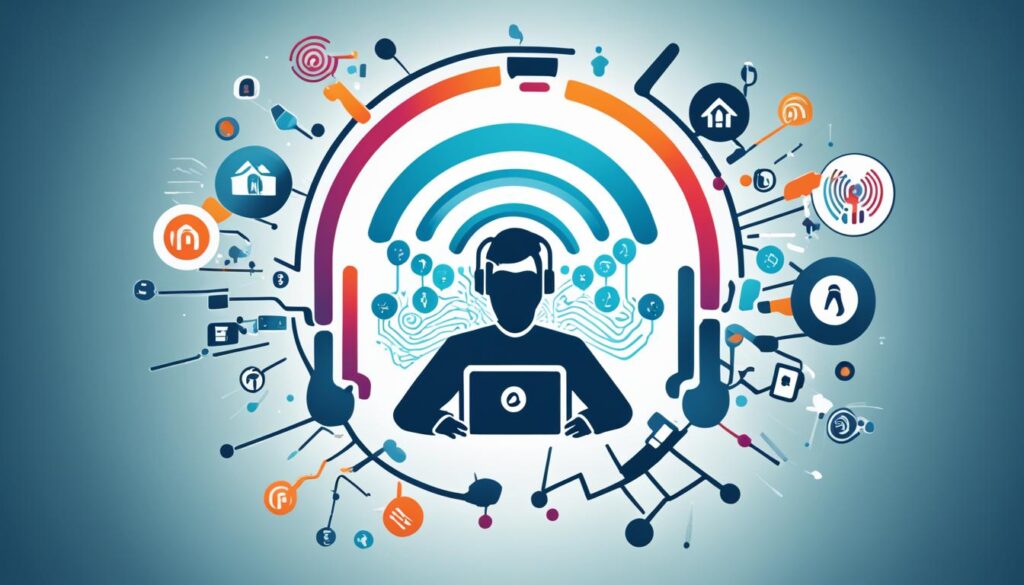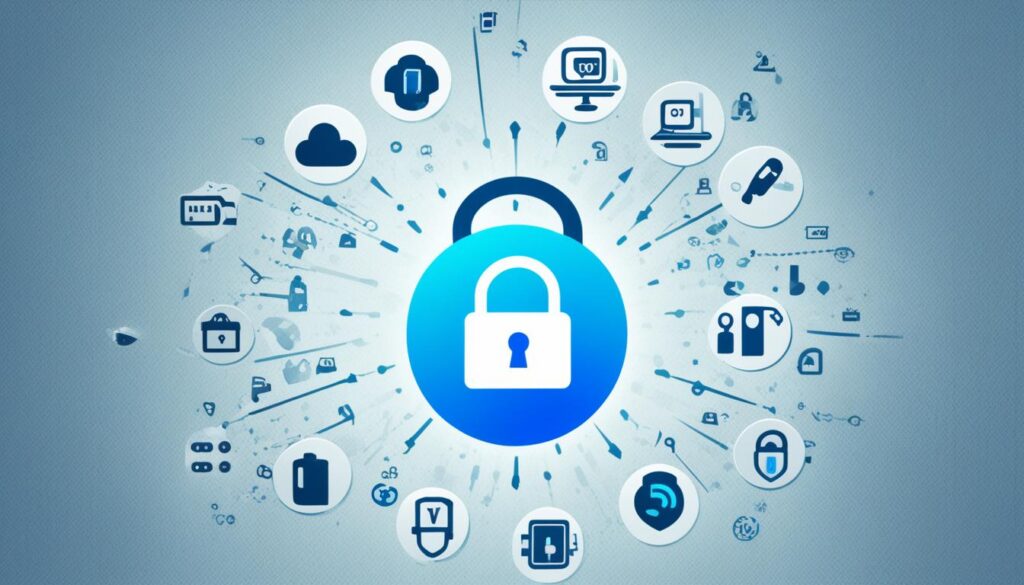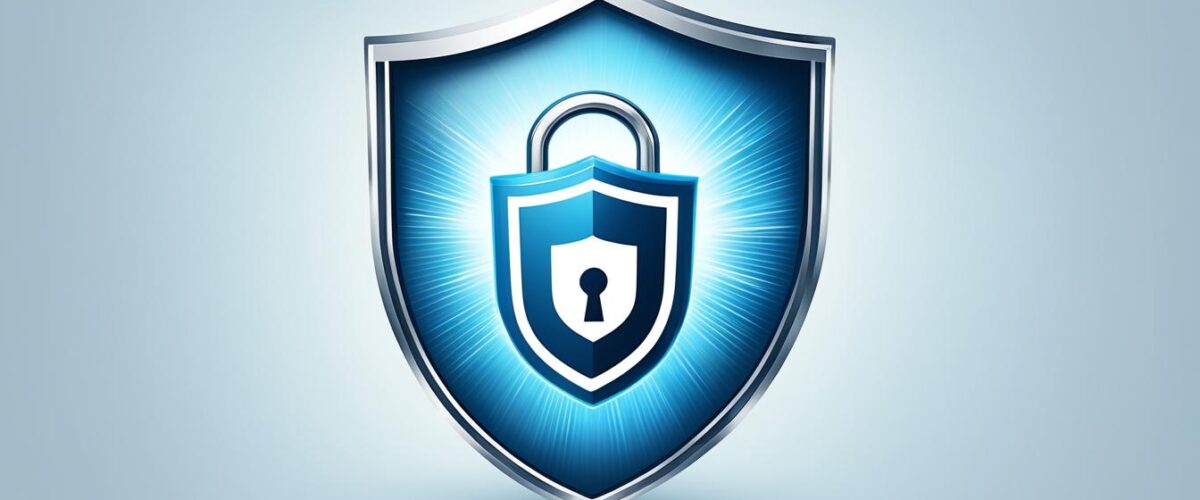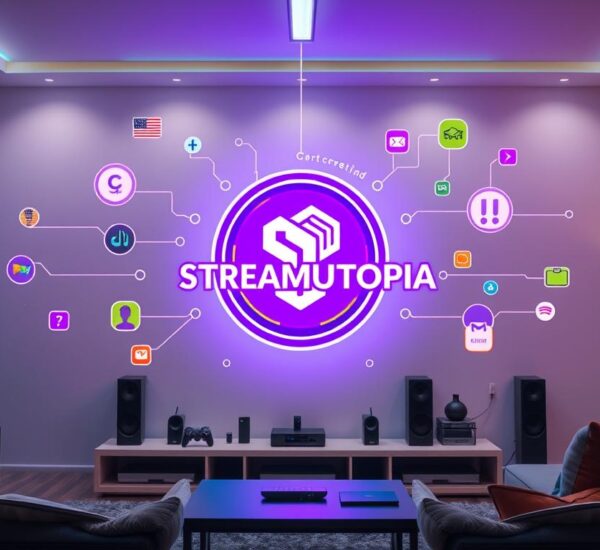Internet Protocol Television (IPTV) is becoming very popular in our digital world. It gives people easy access to lots of entertainment. But, there are big security worries that come with this. Surprisingly, about 70% of IPTV users don’t know about these risks.
Your personal details could be at risk. Cyber threats are growing. So, it’s important to use the best security practices. This keeps your information safe while you enjoy streaming. We will show both IPTV providers and users how to reduce security dangers.
Key Takeaways:
- It’s important for IPTV users to know the dangers to protect themselves.
- Using encryption and strong passwords, plus securing your network, will help keep things safe.
- Always keep your IPTV system up to date to stop hackers from finding a way in.
- Picking trusted IPTV services and connecting to secure networks help keep your data private.
- Learning about IPTV security helps everyone have a worry-free streaming experience.
Understanding IPTV Security Risks
Using IPTV raises big issues about keeping data private and safe from cyber attacks. When we use IPTV, our information is collected and saved. This can lead to our data being leaked or others getting into our accounts without permission.
A major risk is that companies can watch what you like watching. This makes some people worry about their privacy. Also, there are threats like viruses, fake website links, and attempts to steal your information. These dangers can cause a lot of damage, like losing money or having your identity stolen.
It’s really important to use strong security to lower these risks. Knowing about the dangers and taking steps ahead of time can help keep your information safe. This way, you can enjoy watching TV without worry.

Data Privacy Concerns
Privacy is a big deal with IPTV. When companies gather info about us, there’s a chance it might get out. This means someone with bad intentions could see our personal info.
Not only that, but they might figure out what we like to watch. It’s key to look out for our privacy. And, we should put up protections to keep our personal details safe from prying eyes.
Cybersecurity Threats
There are many ways they can attack IPTV systems, and they’re always changing. Malware, like viruses and software that locks up your info, can get in. This could lead to them stealing our data or even controlling our systems.
Phishing is another problem. That’s when they try to trick us into handing over easily-misused info. And hackers could break into our accounts to do bad stuff. This could lead to them stealing our identity or our money. It’s really important to stay alert and put up strong defenses against these attacks.
Essential Security Best Practices
It’s important to keep user data safe and secure in IPTV systems. To do this, IPTV providers should focus on strong security. They need to improve how data is encrypted, protect data better, and use secure login methods. Also, putting network safety first, updating software often, and managing patches well are key.
Encryption and Data Protection
Encryption is key to keeping user data safe. By using encryption at each step, from server to client, data stays secure. Strong encryption makes user info, like logins and personal details, unreadable to others without the right key.
Secure Authentication Mechanisms
Keeping IPTV accounts safe means using solid verification methods. Two-factor authentication (2FA) is a great step. It asks for not just a password but also a unique code. Strong passwords are also really important. They should mix letters, numbers, and symbols.
Network Security Measures
To keep the whole IPTV system safe, firms need strong network protection. Firewalls stop bad access and actions. Intrusion detection systems (IDS) watch for anything suspicious or dangerous. Virtual private networks (VPNs) make sure data moves between users and the system safely.
Regular Software Updates
Updating software regularly is vital for security. When updates are out, IPTV providers must act fast to patch any holes. This keeps their systems safe from cyber threats and working well for users.
Patch Management
Handling patches well is necessary for IPTV security too. Providers must have a good system for finding, testing, and putting out patches. Doing this on time stops attackers from using known weaknesses.
Choosing Reputable IPTV Providers
Choosing a good IPTV service means keeping your data safe. You should pick providers known for protecting your information. Do your homework, read reviews, and check the provider’s history. This helps you decide smartly and go for trusted options.
Top IPTV providers make sure your streaming is smooth. They have strong systems, backups, and few downtimes. With their dedication, you won’t face annoying pauses during your shows or movies.
They also work hard to guard your data. They use special codes and checks to keep your personal info safe. Plus, they set up protective barriers online. Always updating their tools, they fix bugs fast to stop new online risks.
Picking the right IPTV provider means your watching is worry-free. They focus on keeping you safe, your enjoyment high, and your personal stuff private. Doing a bit of digging before signing up ensures you have a great and secure streaming time.
Benefits of Choosing Reputable IPTV Providers:
- Enhanced data security and privacy.
- Reliable IPTV service with minimal downtime.
- Protection against unauthorized access and cyber threats.
- Regular software updates for improved security.
- Improved streaming experience without interruptions.
Top Reputable IPTV Providers
| Provider | Description | Key Features |
|---|---|---|
| Provider A | Lorem ipsum dolor sit amet, consectetur adipiscing elit. Aliquam ut nulla fermentum, interdum massa eu, viverra lectus. |
|
| Provider B | Lorem ipsum dolor sit amet, consectetur adipiscing elit. Aliquam ut nulla fermentum, interdum massa eu, viverra lectus. |
|
| Provider C | Lorem ipsum dolor sit amet, consectetur adipiscing elit. Aliquam ut nulla fermentum, interdum massa eu, viverra lectus. |
|
It’s key to select IPTV providers that care about security, reliability, and privacy. With deep research and customer feedback, you can choose well. Then, you can stream without worry and enjoy your shows the way you should.

Using Secure Networks
Protecting your IPTV streaming is key. Always use secure and password-protected networks. Public Wi-Fi is risky and best avoided when watching IPTV.
Public Wi-Fi is often unsecured and unsafe. Hackers can steal your login and personal details. Using it for IPTV increases the risk of cyber attacks.
It’s best to choose safe networks, like those at home or work. Ensure your Wi-Fi has a strong password and uses encryption like WPA2 or WPA3. This makes your connection more secure.
Using secure networks keeps you safe from cyber threats. It helps protect your personal data. Be smart about network security for a worry-free streaming experience.

Implementing Two-Factor Authentication
Keeping your IPTV accounts safe is very important in our digital world. Using two-factor authentication (2FA) is a great way to do this. With 2FA, your account gets a second layer of security. This makes it hard for bad actors to get in and use your IPTV services without your permission.
When you set up 2FA, getting into your IPTV account includes more than just a username and password. You’ll also have to enter a code sent to your phone or another device. This means, even if someone knows your login details, they can’t get in without your device. So, you’re better protected.
2FA is like having a lock that needs two keys to open. One key is what you know (your password) and the other is something you have (your phone). It makes breaking into your account much harder. This keeps cyber threats away.
Adding 2FA to your account is easy. You can usually turn it on in your account’s settings. Most IPTV service providers let you use 2FA. It’s a good idea to use it to protect your account. This keeps your private data safe and your streaming experience secure.

With two-factor authentication, your IPTV account stays safe. 2FA stops unwanted users from getting in. Your personal info stays protected, and you can enjoy streaming with peace of mind.
Monitoring and Updating
Keeping IPTV systems safe is a job that never stops. It needs constant checking and updating. By staying alert, providers can stop problems like hacking or data theft. This makes sure viewers can enjoy their shows without worry.
Monitoring IPTV Systems
To watch over IPTV systems, various tools are used. These tools keep an eye on network traffic and look for anything strange. They help identify and stop possible threats. Here’s how they do it:
- Firewalls: Firewalls watch network traffic. They block any attempts to access the system that seem fishy.
- Intrusion Detection Systems (IDS): IDS warns administrators if someone is trying to break in. This quick notice can help stop a hack.
- Antivirus Software: Antivirus programs look for and remove harmful software. This keeps user info safe from cyber attacks.
Besides tools, IPTV companies need to respond fast to any security issues. They should regularly check system logs and user activity. This can spot risks early.
Updating IPTV Applications and Devices
Keeping IPTV apps and devices up to date is key for safety. The latest updates help fill in security holes. It also makes everything run better. Users must also update their own devices. This ensures they get the newest security features. Here’s how to update your IPTV:
- Enable Automatic Updates: Turn on automatic updates. This will get you the newest security fixes as soon as possible.
- Regularly Check for Updates: It’s good to sometimes check for updates yourself. This makes sure you’re not missing any important fixes.
- Verify Update Sources: Only get updates from trusted places. This means using the app’s official store or the maker’s website.
By keeping your software and firmware current, you and your service provider make your system safer. This also leads to a better streaming experience for everyone.
Summary
Watching and updating IPTV systems are the foundations of security. They stop user data from being leaked or stolen. Keeping software and devices up to date is essential. It helps avoid new security threats. With everyone on board, IPTV services can be both fun and safe to use.
Education and Information
Teaching people about IPTV security is very important. This includes everyone from employees to customers. It’s crucial for providers to share the best ways to keep data and privacy safe.
Users need to learn about IPTV security too. They can do this by looking up information and reading reviews. This knowledge helps protect them from security threats.
Why IPTV Security Awareness Matters
Understanding IPTV security is key to a safe environment. Knowing about risks and how to stay safe helps everyone. It builds a culture where everyone is looking out for each other.
IPTV Security Best Practices
Everyone involved with IPTV must follow good security practices. This means the companies as well as the customers. Both sides need to work together.
Examples of good security practices include using strong encryption and safe logins. Also, making sure the network is safe with things like firewalls. And don’t forget to update the software often to fix any security issues.
Protecting User Data
IPTV providers must keep user data safe. This involves using many security methods like encryption and regular updates. By doing this, users can enjoy IPTV safely.
Safeguarding Against Illegal Streaming
Illegal IPTV streaming is not just against the law. It also puts your online safety at risk. By using these services, you could face dangers like malware and phishing. Plus, you might be breaking copyright laws. To keep your data and privacy safe, always stream from legal sources.
The Risks of Illegal Streaming
Watching pirated content through illegal sites is dangerous. You risk running into:
- Malware that can harm your devices and swipe your personal info.
- Phishing schemes where scammers try to get your sensitive data.
Aside from these cyber threats, illegal streaming can lead to serious legal trouble.
Legal Consequences of Copyright Infringement
Streaming without permission breaks copyright laws. This means you could get into a lot of trouble. Here are some things that might happen:
- You might get a cease-and-desist letter telling you to stop.
- You could be sued, which might cost you a lot of money in fines.
- For extreme cases, breaking these laws could even lead to jail time.
To protect your data, privacy, and abide by the law, only use legal streaming platforms. By opting for legal options, you not only stay safe but also support a fair digital market.
| Illegal Streaming Risks | Legal Consequences |
|---|---|
| Exposure to malware and malicious software | Cease-and-desist letters |
| Phishing attacks and data breaches | Civil lawsuits and fines |
| Criminal charges and imprisonment |
Conclusion
Keeping user data and privacy safe in IPTV systems is crucial. This means using good security practices like encryption, secure logins, and keeping networks safe. IPTV providers can lower the risk of IPTV cybersecurity dangers with these steps. They can also make sure user information stays safe.
Putting security first makes the streaming experience safe and secure for users. This builds trust in IPTV services. It’s important to keep up with new security challenges. This way, IPTV users can watch their favorite shows without fear.
When IPTV services have the right security, users can relax about their private info. This keeps their data safe, offering a smooth streaming experience. It’s all about setting up good security early. IPTV providers help make the online world safer for everyone this way.
FAQ
What are IPTV security best practices?
What are the risks associated with IPTV security?
How can I protect my IPTV data privacy?
How do I choose a reputable IPTV provider?
Why is it important to use secure networks when streaming IPTV content?
What is two-factor authentication (2FA) and why is it important for IPTV?
How can I monitor and update my IPTV system regularly?
How can I educate myself about IPTV security risks and solutions?
What are the risks of engaging in illegal streaming activities?
How can I ensure a safe and secure streaming experience with IPTV?





